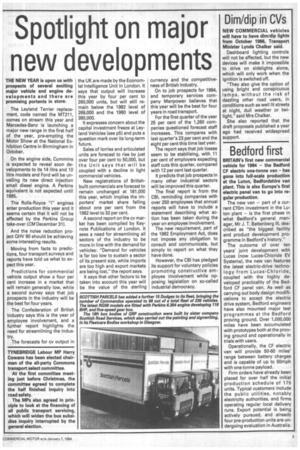Spotlight on major new developments
Page 5

If you've noticed an error in this article please click here to report it so we can fix it.
THE NEW YEAR is upon us with prospects of several exciting major vehicle and engine developments and there are promising portents in store.
The Leyland Terrier replacement, code named the MT211, comes on stream this year and Mercedes-Benz is launching a major new range in the first half of the year, pre-empting the Motor Show at the National Exhibition Centre in Birmingham in October.
On the engine side, Cummins is expected to reveal soon developments to its 14 litre and 10 litre models and Ford will be unveiling its new direct injection small diesel engine. A Perkins equivalent is not expected until 1985.
The Rolls-Royce "i" engines enter production this year and it seems certain that it will not be affected by the Perkins Group take-over (CM December 31).
And the noise reduction project QHV 90 should be achieving some interesting results.
Moving from facts to predictions, four transport surveys and reports have told us what to expect this year.
Predictions for commercial vehicle output show a four per cent increase in a market that will remain generally low, while a second survey says that job prospects in the industry will be the best for four years.
The Confederation of British Industry says this is the year of employee involvement, and a further report highlights the need for streamlining the industry.
The forecasts for cv output in the UK are made by the Economist Intelligence Unit in London. It says that output will increase this year by four per cent to 260,000 units, but will still remain below the 1982 level of 269,000 and the 1980 level of 390,000.
It expresses concern about the capital investment freeze at Leyland Vehicles ;see p5) and puts a question mark over its long-term future.
Sales of lorries and articulated units are forecast to rise by just over four per cent to 50,000, but the Unit says that will be coupled with a decline in light commercial vehicles.
New registrations of Britishbuilt commercials are forecast to remain unchanged at 181,000 this year, which implies the importers' market share falling about one per cent from the 1982 level to 32 per cent.
A second report on the cv market has been compiled by Keynote Publications of London. It sees a need for streamlining all sectors of the industry to be more in line with the demand for vehicles: "Demand for vehicles is far too low to sustain a sector of its present size, while imports are too high and export markets are being lost," the report says.
It says that other factors to be taken into account this year will be the value of the sterling currency and the competitiveness of British Industry.
On to job prospects for 1984, and temporary services company Manpower believes that this year will be the best for four years in road transport.
For the first quarter of the year 25 per cent of the 1,260 companies questioned forecast staff increases. This compares with last quarter's 23 per cent and the eight per cent this time last year.
The report says that job losses seem to be stabilising, with 11 per cent of employers expecting staff cuts this quarter, compared with 12 per cent last quarter.
It predicts that job prospects in many other industrial sectors will be improved this quarter.
The final report is from the CBI, reminding companies with over 250 employees that annual reports will have to include a statement describing what action has been taken during the year on employee involvement.
The new requirement, part of the 1982 Employment Act, does not impose any obligation to consult and communicate, but simply to report on what they have done.
However, the CBI has pledged its support for voluntary policies promoting constructive employee involvement while opposing legislation on so-called industrial democracy.










































































